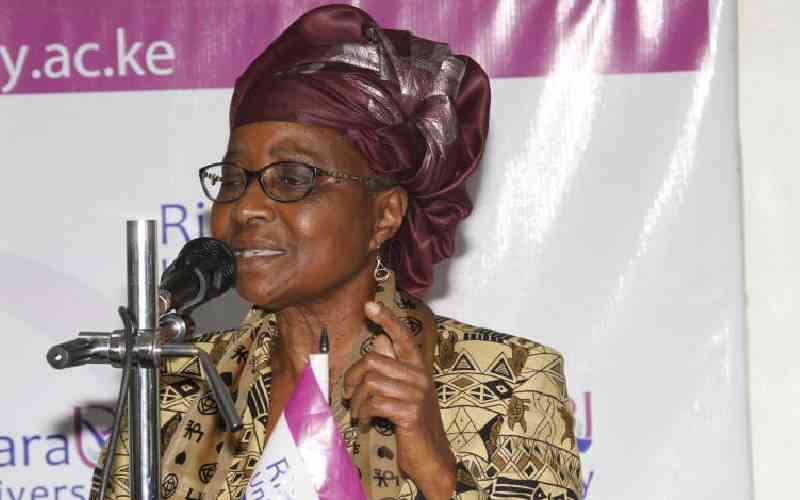 |
|
Former Chief Khadi of Kenya Sheikh Hammad Kassim Mazrui (in Court) leads family, relatives of Professor Ali Mazrui in prayers at the family house in Old Town, Mombasa |
The news of the death of Ali Mazrui spread fast yesterday morning across Kenya as many eulogised the grey-haired academician and arguably one of Kenya's most decorated intellectuals.
Prof Mazrui died yesterday in the US after a long illness. He was 81.
Born in 1933 in Mombasa, Mazrui was sent to England by the Government of Kenya in 1955 for his secondary school education.
It is from here that he grew to be a distinguished scholar who documented history in films, public lectures and writings. His checkered career saw him pursue a Bachelor of Arts degree at the Manchester University where he graduated with a distinction. He would later undertake his masters studies at Columbia University in New York before enrolling for his PhD at Oxford University.
skipped ranks
Between 1963-1973, Mazrui taught at Makerere University in Uganda, where he served as head of the department of Political Science and as also as Dean of the Faculty of Social Sciences. It is here that he began his teaching career that would take him to various universities across the globe.
Mazrui was the first young scholar in Africa to be promoted from lecturer to full professor in less than two years, skipping the intermediate ranks of senior lecturer and associate professor.
He was honoured for his works by, among others, the House of Lords in London and the Library of Congress in Washington DC. He published over 40 books and penned several articles in major journals and newspapers across the globe.
In 2005, the Foreign Policy Magazine in Washington DC nominated Mazrui among 100 greatest public intellectuals alive.
The African Studies Review described him as an "avatar of controversy." It said: "Ali A. Mazrui is legendary for the fertility of his mind. With clarity, grace, and imagination, he has written and published to date more than forty books and a large number of essays. This is a massive body of knowledge by any measure. In terms of the range of areas he has explored with uncommon flair and in his contributions to scholarship and policy debates, Mazrui has simply no peers in Africa."
His intellectual journey took him to the world leading universities among them Stanford, Harvard, Cambridge, Oxford and Cornell. He was also professor at large in more than a dozen universities.
He was visiting scholar at Stanford, Chicago, Colgate, Singapore, Australia, Malaysia, Oxford, Harvard, Bridgewater and Cairo to mention but a few. His works were among those of pioneer scholars to have published in the Journal of American Political Science Association from 1963.
Global issues
At Oxford University, he left another milestone by being the first African scholar to publish three books within a year. The books were Towards a Pax Africana: A Study of Ideology and Ambition, On Heroes and Uhuru-Worship and Political Friction and Cultural Fusion.
His books distinguished him as an authority in African, Islamic and global issues. He will also be remembered for his unique series on BBC, The Triple Heritage narrations.
Stay informed. Subscribe to our newsletter
Interestingly, for a man who scored many firsts, the best Kenya could offer him was to be Chancellor of Jomo Kenyatta University of Agriculture and Technology between 2004-2010.
President Mwai Kibaki also bestowed on him Order of Burning Spear. He was also once feted alongside other Kenyans as one of the country's heroes (Mashujaa) since independence.
Mazrui did not shy away from controversy. He rendered his opinions on film, articles and academic papers with well-researched presentations.
An intellectual to the core, Mazrui always allowed his critics to rebut his arguments. However, his exchanges with other local academics sometimes seemed to border on personal attacks.
He also served at the United Nations Educational, Scientific and Cultural Organisation (Unesco) and was at one time a special adviser to the World Bank.
He is survived by his widow Pauline and five sons. His body will be flown to Kenya for burial.
 The Standard Group Plc is a
multi-media organization with investments in media platforms spanning newspaper
print operations, television, radio broadcasting, digital and online services. The
Standard Group is recognized as a leading multi-media house in Kenya with a key
influence in matters of national and international interest.
The Standard Group Plc is a
multi-media organization with investments in media platforms spanning newspaper
print operations, television, radio broadcasting, digital and online services. The
Standard Group is recognized as a leading multi-media house in Kenya with a key
influence in matters of national and international interest.
 The Standard Group Plc is a
multi-media organization with investments in media platforms spanning newspaper
print operations, television, radio broadcasting, digital and online services. The
Standard Group is recognized as a leading multi-media house in Kenya with a key
influence in matters of national and international interest.
The Standard Group Plc is a
multi-media organization with investments in media platforms spanning newspaper
print operations, television, radio broadcasting, digital and online services. The
Standard Group is recognized as a leading multi-media house in Kenya with a key
influence in matters of national and international interest.







